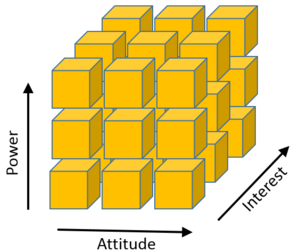Stakeholder Analysis
| Line 5: | Line 5: | ||
''Person, group or organization that has interests in, or can affect, be | ''Person, group or organization that has interests in, or can affect, be | ||
| − | affected by, or perceive itself to be affected by, any aspect of the project.'' | + | affected by, or perceive itself to be affected by, any aspect of the project. |
| − | + | '' | |
Many other versions of this definition can be found in the literature but in general containing same content. | Many other versions of this definition can be found in the literature but in general containing same content. | ||
Revision as of 11:46, 23 November 2014
Contents |
Introduction
According to the ISO 21500 standard a stakeholder is defined as:
Person, group or organization that has interests in, or can affect, be affected by, or perceive itself to be affected by, any aspect of the project. Many other versions of this definition can be found in the literature but in general containing same content.
Management of a projects, programs or portfolios happens to be complex and require an extensive overview of several aspects and constraints. But in order to act appropriate and create sustainability the management often has to consider these aspects and constraints not only from their own point of view but also from a number of other stakeholders views.
It is important for the management to know who their stakeholders are and there characteristics in relation to the project, program or portfolio. This might be their influence, impact, interest, attitude etc.
In stakeholder analysis all stakeholders first have to be identified and relevant information gathered. The stakeholders are then mapped based on relevant parameters. Some of the most typical parameters when mapping are power, interest and influence, which is often visualised in a 2D diagram. The map gives an overview of the stakeholders and can be foundation for planning how to deal with stakeholders.
Definition
Background
- Dodd (1932)
- Friedman (1962)
- Stanford Institute, SRI (1963)
- Hirschman (1970)
- Friedman (1970)
- Freeman (1984)
- Milgorm and Roberts (1992)
- Donaldson and Preston (1995)
- Freeman (1998)
- Mercier (1999)
- Jensen (2002)
Process
- Identify stakeholders (brain storm, stakeholders could for example be: Employees Shareholders Media Suppliers Government Customers Community Managers Directors Competitors Sponsors Consumers)
- Define key stakeholders
- Collect relevant information
- Stakeholder table
- Stakeholder map
- Dealing with stakeholders
Mapping stakeholders
- Why mapping stakeholders?
Types of maps
- Power/Interest diagram
- Interest/Influence diagram
- 3D mapping
- Stakeholder Circle
Challenges and uncertainty
Other methods
Methods/tools to use together with the stakeholder analysis
